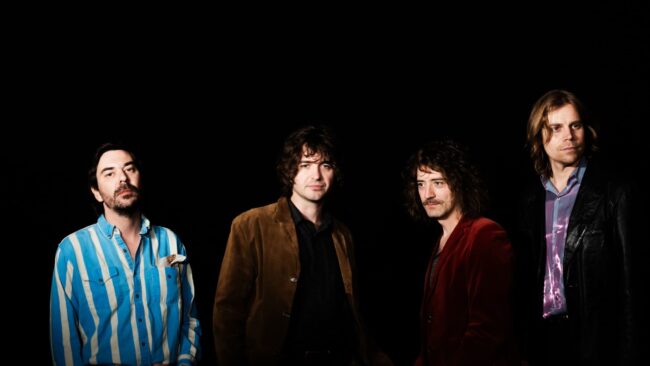
Sun • Sep 21, 2025
Night Moves
Raybody
Tickets are non-transferable until 72 hours prior to the show time. Any tickets suspected of being purchased for the sole purpose of reselling can be cancelled at the discretion of The Atlantis / Ticketmaster, and buyers may be denied future ticket purchases for I.M.P. shows. Opening acts, door times, and set times are always subject to change.
Night Moves

Bless its battered body, but the Night Moves tour van is a piece of shit. It is your standard-issue blue Ford E-350 now months away from its 25th birthday, the sort of vehicle that occasionally prompts so-called normal folks to give the grimy musicians inside suspect stares. The catalytic converter has been stolen three times, so it’s now permanently straight-piped; the exhaust leaks through the holes and cracks in the sides, slowly gassing anyone inside. The wheel wells are shambles. And while John Pelant was writing Double Life, Night Moves’ fourth LP and first in six years, someone swiped the license plates just after he had paid for new tags. God fucking dammit, he remembers thinking. Who the hell steals a license plate?
But Pelant soon sublimated his frustration, turning his vision of a thief who had “borrowed” the plate in order to commit more crimes elsewhere into one of the most winning tunes in Night Moves’ country-soul-psych-rock catalogue, “Daytona.” As sun-swept synthesizers and pedal steel curl around stuttering drums, Pelant offers an empathetic portrait of someone doing whatever is necessary to reinvent their lives. “Daytona, you only wanted a win,” he opens the final verse. “Daytona, no chance I’ll see you again.” There’s irritation in his voice, sure, but mostly there’s acceptance, an understanding that he cannot comprehend someone else’s difficulties and that he has plenty of his own.
That is the spirit that animates and enlivens Double Life, a cozy and cool LP built largely from a string of very rough breaks that Pelant and Night Moves have navigated in recent years. There was the unexpected death of a father-in-law, then a drummer whose skin sloughed off during recording due to contact dermatitis. There were friends arrested for making mistakes in troubled times and assorted pals struggling with sobriety and sanity. And there was, once again, the ever-vexing question for artists about when they’re supposed to step into the responsibilities of adulthood and maybe away from the lifelong compulsion to create, especially as Pelant started thinking seriously about marriage for the first time in his life. Pelant is the sort of songwriter who starts with the music—inspired of late by Glen Campbell and Bobby Caldwell, Cleaners from Venus and early ’90s country, Panda Bear and (as ever) Gram Parsons—and then writes lyrics only after he’s sat with the tune a spell. But this time, these songs are direct documents of Pelant’s life as he searches for silver linings or at least valuable meanings during a moment when very little seemed golden. Double Life is about moving through, not moving on.
Pelant started writing Double Life in the Minneapolis duplex he shares with his fiancée, Tasha. But those early and sometimes-forlorn drafts rightfully bummed her out, especially since some of it spoke of her own woes. So Pelant started treating Night Moves’ little rehearsal room—stuck in a grim industrial zone of the city, surrounded by garbage dumps and foundry fumes—as an office, showing up with workmanlike diligence to keep crafting demos.
That proved to be a tough hang, too: Separated by paper-thin walls, Pelant soon figured out his drug-addled neighbor not only lived there but would also erupt into near-daily shouting matches with his partner. He’d spill Big Gulp cups of piss in their shared hallway. It was worrying, but Pelant kept at it, anyway. He’d drive around, delivering hard liquor and wine at his new day job, where Def Leppard’s “Photograph” seemed to play always, the hit hammering through his hangovers. He pondered cycles of addiction and thought a lot about death, apt since that gig was next to another warehouse that sold funeral supplies. He listened to works in progress as he jockeyed the booze, working until he and the band felt they had the core of a record ready.
Again, not as easy as it sounds: Night Moves cycled through two producers who had first sounded like dream collaborators but just didn’t fit their vibe. Once again, Night Moves opted to return to their own practice space, recording the bulk of the album there after capturing basic tracks at Minnesota’s legendary Pachyderm. The decision afforded the band, for the first time, the challenge and luxury of producing themselves, of making every decision about tone and arrangement and timing before passing the songs to Woods sonic mastermind Jarvis Taveniere for mixing and co-production.
Those travails were, turns out, worth it. Double Life is at once the most candid and impressionistic Night Moves album yet, built on personal experiences but written so that you can map your own life onto these songs, too. Witness, for instance, “Hold On To Tonight,” a kaleidoscopic soul tune that was inspired by that death in the family; it’s a snapshot from a boozy night alone, when you stumble into the realization that the only thing you’re holding onto is fading memories. “Ring My Bell” is its musical and emotional counterpart, with Pelant extending an invitation to be asked for help whenever times get inevitably tough, all above the spring-loaded rhythm of drummer Mark Hanson and bassist Micky Alfano. “You’ve got a sadness hanging in your eyes,” Pelant sings, slipping into a bridge that Steely Dan would have loved. “Well, I just wish that I could change your mind.” This song, at least, offers a fighting chance to do just that.
Night Moves has a repeated joke when they’re on the road, driving from town to town in their bruised van: “I can’t believe I have to do this again,” they say, a reference to the surrealist repetition of shows, parties, hangovers, and long hauls that define touring. That line shows up during “This Time Tomorrow,” a could-have-been Petty hit updated with the malaise and wanderlust of modern life. “I can’t believe I have to do this again, oh this again, this time tomorrow,” Pelant sings alongside Charles Murlowski’s mocking riff. “Laughing at the joke, but the joke’s my life.” It can feel that way for all of us sometimes, right? But on Double Life, Night Moves does not retreat from the struggles and complexities of life. They, instead, double down with songs that stare them in the face and turn forward on their own terms.
Rachel Bobbitt

Raybody

Raybody (fka Katy Rea) makes classic singer-songwriter shit that gets weird. Her singular vocal is intense, melodic, and endlessly dynamic. Paired with a band that deeply understands her songwriting, Raybody capture’s audiences in her current home of Brooklyn and across the US. Past bills with: Little Wings, Mei Semones, Allegra Kreiger, Being Dead, Lily Seabird, Bartees Strange, You Bet, Florry, & more.
Born in Houston, Texas, Katy Rea's mother sang Linda Ronstadt around the house. Her father, a writer, played Leonard Cohen and Dylan. He would say, “You only need a few chords and the truth to write a good song.” Her debut album, The Urge That Saves You(2022) is a hook-filled, fully live record providing plenty of stories and emotions that stick with you, while splitting off into cinematic, dark psychedelia.
Recently she adopted the moniker, Raybody. “It allows me to step into a braver and more honest part of myself. I’m after a truth that requires me to unattach from my given name, which has always felt sweet, well mannered, and more feminine than I am.”
Her band (Andrew Forman, Ethan Kogan) also reflect something more fierce than ‘Katy’ seems on the surface. The spirited cast of jazz trained, heavy hitters in the NYC experimental and indie rock scene interpret her songs with a capacity that's both crushing and soaring. “I feel like I'm flying when I play with this band…we push ourselves hard to meet something transcendent, and trust each other. But we don’t take ourselves too seriously. We are total goofs off stage.”
To Katy, today’s virality obsession feels unnatural and fleeting. She’s on her own clock. “I’m learning how to be simple and that is hard. I want to deliver songs that reflect the beautiful, heavy irony of living—to help people feel less alone. I want to write classic songs they can hold with them for a long time.”
An engineer at Bushwick’s Black Lodge Recording, she is in the depths of creating her second album of originals. Engineering and mixing her own work was at first, a way to afford her love of making albums, but quickly it developed into a signature sound. Every tone and texture all the way up to mastering, is developed through Katy’s point of view, her hands on the gear.



